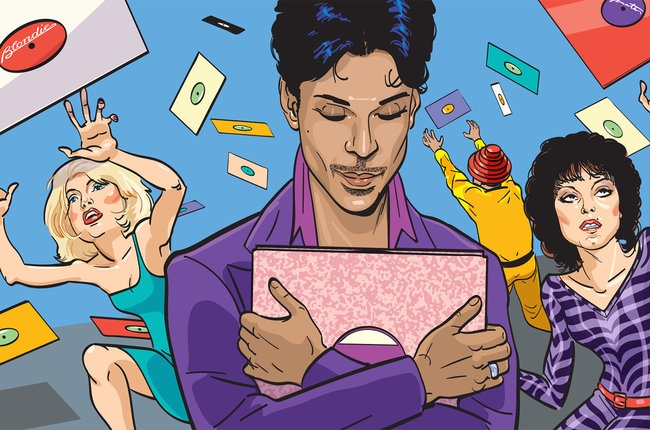Todd Rundgren is on a mission rarely accomplished by music stars: he wants the copyrights to his albums back.
So recently, when the 69-year-old rocker got a call from Copyright Termination Experts offering to help him free of charge, he accepted. The outfit helped him file notices with the U.S. Copyright office to retrieve ownership of some of the music he released more than three decades ago with Warner Music Group.
"Why would a label be insisting on keeping a property that has stopped selling, that they don’t have any plans to re-promote except when the artist dies?" asks Rundgren, whose hits include "I Saw The Light" and "Bang on the Drum All Day," though he is seeking rights to lesser-known solo work and albums he issued with his former band, Utopia.
Rundgren is one of a slew of legendary acts hoping to take advantage of the 1976 Copyright Revision Act, which grants artists the ability to reclaim their rights to recordings made from 1978 onward after 35 years, provided they file the right paperwork ahead of time. Billy Joel, Pat Benatar, Blondie, Devo, the Talking Heads, the Police, Peter Frampton, and Joni Mitchell are among the icons who’ve filed such termination requests for hundreds of works over the last 14 years (acts are eligible to begin filing paperwork 10 years before the reversion period), seeking to reclaim rights on big hit albums as well as records that were considered commercial duds in their day.
But giving back copyrights is anathema to the major record companies, which saw catalog grow to 66.2 percent of total consumption last year, according to Nielsen Music, thanks to the fast-growing ranks of subscribers to services like Spotify, Apple Music and Amazon Music Unlimited. Over the past four years, less than two dozen of the thousands of artists eligible to reclaim the rights to their master recordings have succeeded, Billboard's research has found, while only hundreds have tried. That means that most recording artists are not even trying to take advantage of this right bequeathed to them by the U.S. Congress in the 1976 Copyright revision.
The process is shrouded in secrecy: The few artists who have wrested their rights back from major labels have typically agreed not to blab, signing strict non-disclosure agreements at the labels’ behest, sources tell Billboard. For their part, label executives say the appearance of secrecy on the issue is misconstrued because they can’t disclose confidential artist contract information.
Besides, labels much prefer to offer these acts higher royalty rates or rich advances in order to hold onto the rights, rather than returning masters - a precedent they want to avoid setting at any cost.
"We are not in the business of giving our masters back to artists," one major-label executive tells Billboard. Lawyers tell Billboard that labels have asked artists on a number of occasions to waive their termination claims in exchange for other compensation, while labels have ignored other claims altogether.
But to some artists, higher royalty rates are meaningless if the label does nothing to re-promote their tunes. Singer-songwriter Louise Goffin, who made three albums for Warner Music Group labels between 1979 and 1989, says the reason she wants her albums back is "to have creative control over how I am presented. I am not going to make a bunch of money, but if I can get back my albums and be able to promote them so the albums are not being ignored, that would be delightful." She adds that her predicament is common for veteran acts: "There is always the point where the label moves on when the second single doesn’t sell; or the label has a changing of the guard. Soon, you find yourself stuck with people who don’t know who you are and you have no sovereignty over your work, and it just sits in the vaults. That is where the artists have their souls destroyed."
In a rare admission, Warner Music Group has acknowledged returning U.S. copyrights to one artist -- Prince -- on some of the late pop star’s studio albums, as part of a 2014 contract negotiation to reissue his classic works. WMG is known as the most artist-friendly of the three majors on the issue, but Sony Music Entertainment has given some artists back their album rights as well, one executive familiar with the deals tells Billboard. All three majors declined to comment for this story.
Evan Cohen, a lawyer and publishing catalog administrator in Los Angeles who owns a label called Manifesto Records, founded Copyright Termination Experts in 2014 because he believes most artists aren’t aware of their right to reclaim their recorded music rights, and has contacted close to 1,000 artists that issued albums between 1979 and 1985.
"I am doing this for free as part of my business," says Cohen, who is working on over 200 terminations and adds that it helps him grow his client base while it’s also "an honor to help artists I admire."
He says that acts including John Waite, Asleep At The Wheel, Suzi Quatro, the Fleshtones, Rita Coolidge, Stephen Bishop and Robbie Dupree have received album rights back, and that he has reached agreements to recover rights to albums by Rundgren and Goffin. Some label executives deny returning albums to Cohen’s clients, but acknowledge having had extensive discussions with him, with one label executive describing him as a "bulldog that won’t let go of the bone."
Label executives tell Billboard they speak to Cohen as a courtesy to the artists he is representing, and say that they are willing to negotiate anything but the return of the albums. In one instance, a label loaned a master to one of Cohen's artist-clients so that the artist could copy it, but an executive said that label hasn’t relinquished the copyright to that master.
Cohen disagrees, but tells Billboard: "I understand [the labels] have an interest in misrepresenting the current state of affairs."
Copyrights protected by 1976 law started coming up for expiration in 2013. While songwriters are regularly able to claw back publishing ownership of their songs, one reason that performing artists have faced more difficulty is that the copyright revision act contained exceptions: works that are created under "work-for-hire" contracts; and collective works, meaning records with many creators. An artist group led by Don Henley went to war with the Recording Industry Association of America in the late 1990s over a small provision buried in a 1,740 page bill that had deemed sound recordings works-for-hire, and thus ineligible for eventual copyright reversions to the artists. Congress agreed to re-word the provision, but whether sound recordings qualify as works-for-hire is still an open question.
These grey legal issues can only be resolved in court, a place that neither labels nor artists want to go, in part because both sides are afraid of a precedent-setting decision. A victory for labels would mean less generous contract-renegotiation terms for artists; a victory for artists would put the labels’ entire catalogs at risk. A court battle might not be worth the money, either. A full-fledged court battle with appeals could run more than $5 million in legal fees, more than any old album is now likely to generate, making it a financially daunting -- and probably an unrewarding -- challenge.
"If any artist were to sue to make their termination claim valid, the labels will fight artists on this issue to the ends of the earth," says one lawyer who was worked with artists that had filed for termination.
As for Rundgren, he realizes that if he does get his albums back, he will need "to bring them back from a moribund state where nobody is covering them or listening to them. You need a plan to get this music exposed."
This article originally appeared in the Oct. 7 issue of Billboard.








